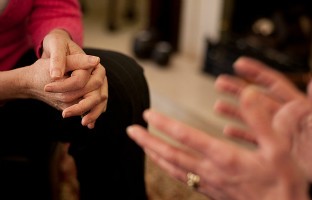Battle scars: Veterans turn to clergy for counseling
When Mike walked into my office for an academic advising appointment, I knew something was wrong. His normally pale face was a deep lobster red. His hair was mussed, and he was carrying a large, empty cardboard box. Instead of discussing his courses he rambled incoherently about a trio of ducks that were following him around the university campus. The purpose of the box, he said, was to help him catch the ducks, take them to the banks of a nearby river and release them so that they would stop bothering him. It gradually dawned on me that he was hallucinating.
As the semester progressed, Mike's mental health deteriorated dramatically. He was expelled from two of his classes, was arrested in the student union for being disruptive, and then discharged a fire extinguisher in the back of a police car. I began to receive calls, visits and e-mails from distraught students who were in his classes. They were afraid of Mike and wanted him removed from campus. I followed the standard procedures for a student crisis, working through the university system to address Mike's situation. But as his condition rapidly worsened, the Lutheran campus chaplain decided to call Mike's parents, who rushed to campus and located a facility with the kind of mental health services that Mike so desperately needed. Mike was hospitalized for ten weeks, then took a leave of absence from the university.
Mike is one of thousands of veterans of the wars in Iraq and Afghanistan who have attended or are attending college on the new GI Bill. As a large, public university in the American heartland, West Virginia University has had significant numbers of student veterans on its campus for several years, and many of them are struggling with religious concerns and psychological conditions. The university has gone to great lengths to support its student veterans, offering veterans-only sections for some classes, an Office of Veterans Affairs to help them with GI Bill paperwork, and a student veterans club where they can meet and socialize. They are eligible for psychological services through the student mental health clinic.






